High-end Forum on Cultivating Innovative Talent in Journalism and Communication
2022-11-22
In order to implement the requirement of "comprehensively improving the quality of independent training of talent, making efforts to create top innovative talents, and gathering talents worldwide" in the report of the 20th Party Congress, the School of Journalism and Communication of Renmin University of China hosted a high-end forum on "Chinese characteristics, world-class" journalism and communication training of top innovative talents on November 19, inviting academic colleagues to gather online discussing the topics on cultivation rules of top innovative talents in journalism and communication, innovation model of education, construction of educational community, and evaluation system of the subject. The forum contained a main forum and five parallel sub-forums on the construction of national first-class undergraduate majors. The main forum, chaired by Zhou Yong, Executive Dean of the School of Journalism and Communication of Renmin University of China, was divided into five sessions, where scholars shared their insights online.

Hu Baijing, Deputy Secretary of the Party Committee and Vice President of Renmin University of China, attended the forum and delivered a speech. He said that at a time when journalism and communication practices are constantly changing and academics are continuously innovating, the cultivation of top innovative talents remains the fundamental task of journalism and communication professional education. In terms of how to cultivate innovative talents in journalism and communication, Hu highlighted that journalism and communication talents need to be trained for Chinese modernization, and the spirit of the 20th Party Congress report should be applied to the cultivation of talents; the positioning of journalism talents should be reshaped according to the laws of journalism and public opinion, media integration and public communication practices, technological changes, international communication needs and new forms of human civilization. Additionally, it is necessary to shape a high-quality journalism and communication talent training system by focusing on four aspects: value shaping, problem-solving, competence development, and knowledge construction. Hu stressed that no matter how the discipline of journalism and communication is reformed, it should be centered on the growth of students for maximizing their authentic growth.
The first module of the forum was chaired by Wang Runze, Vice Dean of the School of Journalism and Communicationof Renmin University of China and President of the Chinese Journalism History Society.
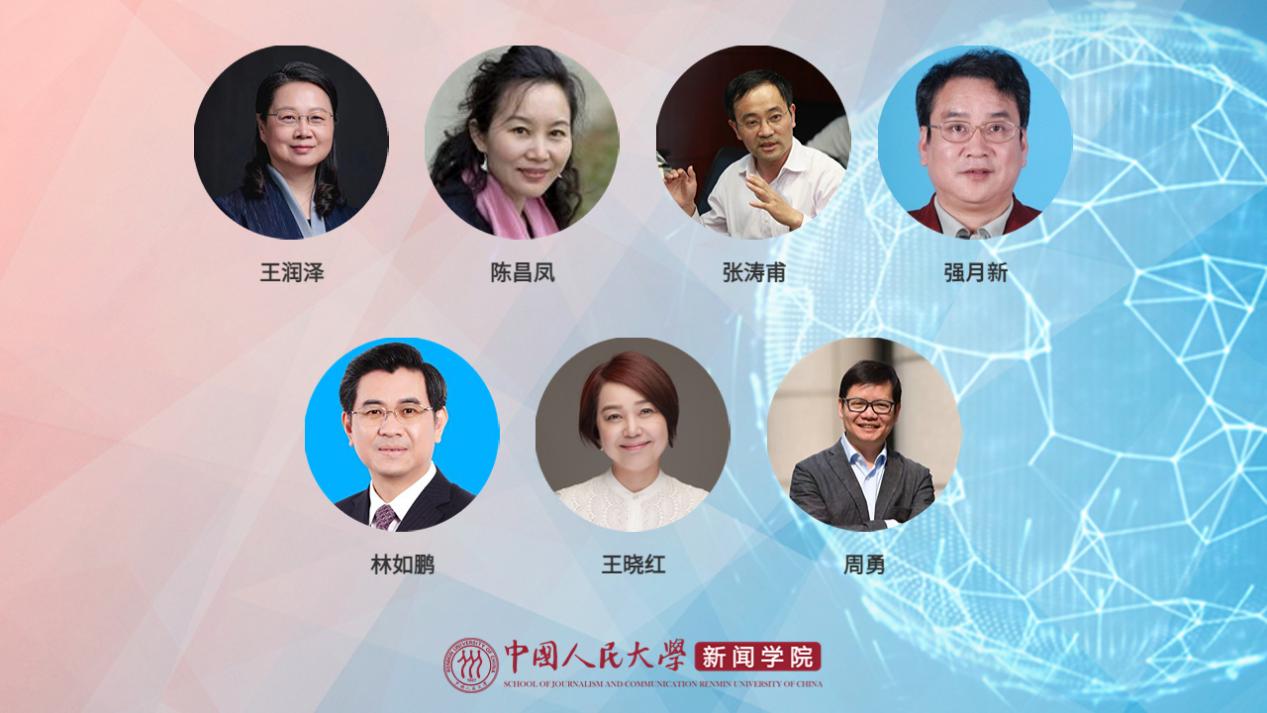
Professor Chen Changfeng from the School of Journalism and Communication of Tsinghua University shared her views on the theme of "What is still missing in the cultivation of top innovative talents". She supposed that cultivating top talents had been a consensus. And the process of cultivation needs to focus more on innovation in educational concepts, institutional mechanisms, and models. The training of Vietnamese journalists should highlight emotional mission, intellectual judgment and professional spiritual competence.
Lin Rupeng, Party Secretary of Jinan University shared the results of the training of journalism talents in Guangdong-Hong Kong-Macao Greater Bay Area as a case study. By Presenting examples of "all-scene" practices including the Sound and Sea Studio, Integrated Communication Training Camp, Communication China Training Camp, Functional Game Training Camp, Panorama Studio and True Detective Studio, he introduced in detail the specific initiatives of Jinan University in cultivating talents in the areas of thought leadership, practice cultivation, and peer leadership, providing inspiration and reference for the participants.
According to Zhou Yong, the essential mission and task of journalism and communication education in China is to cultivate a host of outstanding journalism and communication talents in the process of promoting the great rejuvenation of the Chinese nation with Chinese modernization. It is vital to open up the whole chain of talent training with mechanism innovation and solve the obstruction problem at both the supply and demand ends of talent training through the construction of a community of journalism education and practice, so as to form a joint force. He believes that, at present, as construction of the new liberal arts deepens, local reforms based on elements and scenarios can hardly fundamentally respond to the needs of the times for journalism and communication talent training, and need to be systematically reshaped and holistically reconstructed. In the horizontal dimension, it is indispensable to break down all the barriers of professional disciplines and to integrate courses, majors, and disciplinary knowledge in a global multidisciplinary manner. In the vertical dimension, it is necessary to adhere to the growth of students as the centre, improve the evaluation criteria of students' growth, and break through the barriers of academic programmes at all stages of undergraduate and doctoral studies, in an effort to drive the comprehensive reform of talent training.
QiangYuexin, Dean of the School of Journalism and Communication of Wuhan University, analyzed how to cultivate talents by starting with collaborative education, and shared his thoughts on the connotation, path, and construction methods of collaborative education. In his view, there are three ways to construct collaborative education in journalism and communication disciplines, namely, multi-dimensional collaboration, cross-border intersection, and multi-dimensional progression, and there is still a need to consider how to adhere to the subjectivity of journalism and communication disciplines, and how to shape the scientific nature of the collaborative education system and strengthen the innovation of the collaborative education model.
Zhang Taofu, Dean of the School of Journalism of Fudan University, presented his views on the theme of "Digital China and the orientation of the journalism and communication profession". He pointed out that the development of technology has pushed journalism and communication to the forefront of the world, and the journalism and communication profession is faced with the challenges of liquid scenarios, multi-correlation variables, uncertainty clustering and knowledge flow, based on which it is worthwhile for the journalism and communication profession to reshape the three frameworks of value, knowledge and competence.
Wang Xiaohong, Dean of Undergraduate Studies, Communication University of China,also said that a scientific and reasonable education system includes 3 propositions: shaping values, building knowledge and promoting innovation, adding that value is the driving force, knowledge is the carrier and the institutional space for innovation is the guarantee.
Zhou Yong held the second module. Leaders from other schools shared their insights.
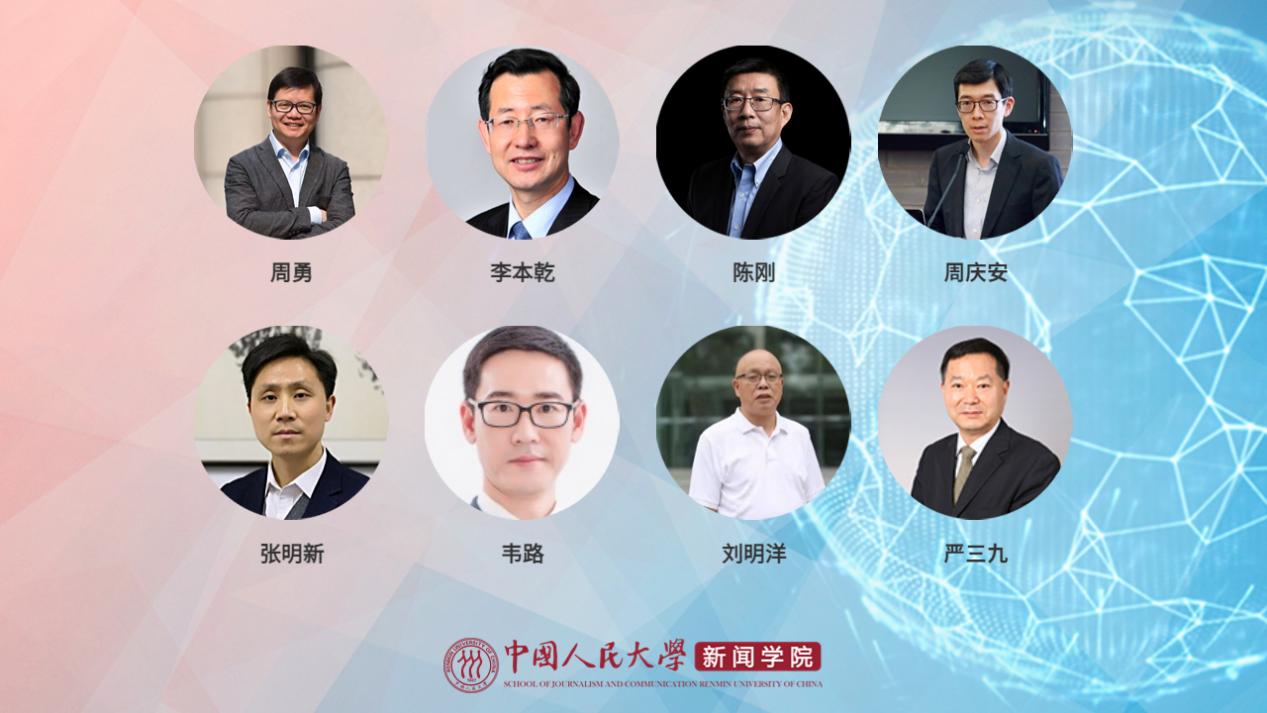
Li Benqian,Dean of the School of Media and Communication of Shanghai Jiao Tong University, and Wei Lu, Dean of the College of Media and International Culture of Zhejiang University, shared theirprogramme for the training of excellent journalism and communication talents for the national integrated media strategy with two schools respectively. Yan Sanjiu, Dean of the School of Journalism and Communication of Shanghai University, shared opinions about the ecology of cultivating innovative journalism and communication talents, using the concrete practice of Shanghai University's Joint Assignment Workshop as an example.
According to Chen Gang, Dean of the School of Journalism and Communication of Peking University, the cultivation of journalism and communication education talents in the new era requires political, technical, dynamic, systematic, and global thinking. Educators need to build up an organic, systemic system.
Zhou Qing'an, Dean of the School of Journalism and Communication, Tsinghua University, mentioned the concept of creating a "chip talent" in journalism and communication andemphasized that improving narrative skills should be the core and that students should develop the ability to understand multi-media platforms, international dialogue and report on specific areas.
Zhang Mingxin, Dean of the School of Journalism and Information Communication of Huazhong University of Science and Technology, focused on the training of young teachers and how to build a high-quality faculty with a humanistic approach. He said that the teaching staff determines the quality of teaching and the effectiveness of moral education. To build a high-quality faculty, it is necessary to adhere to the principles of people-centeredness, comprehensiveness and sustainable development. Specifically, it is necessary to create a sense of identity, strengthen the awareness of professionalism, and gain a sense of respect and achievement among the teaching community.
Liu Mingyang, Dean of the School of Journalism and Communication of Shandong University, expressed his insights on the construction of value system, the construction of standard system and the shaping of cultivation system for talent cultivation. He believed that the construction of value system is the root of the cultivation of top talents, practice can be one of the criteria for the system, and talent cultivation needs to adhere to the combination of national and local, high-end and basic, college and social cultivation.
The third module was chaired by Li Biao, Vice Dean of the School of Journalism and Communication of Renmin University of China. Teachers of journalism and communication participated in the discussion.
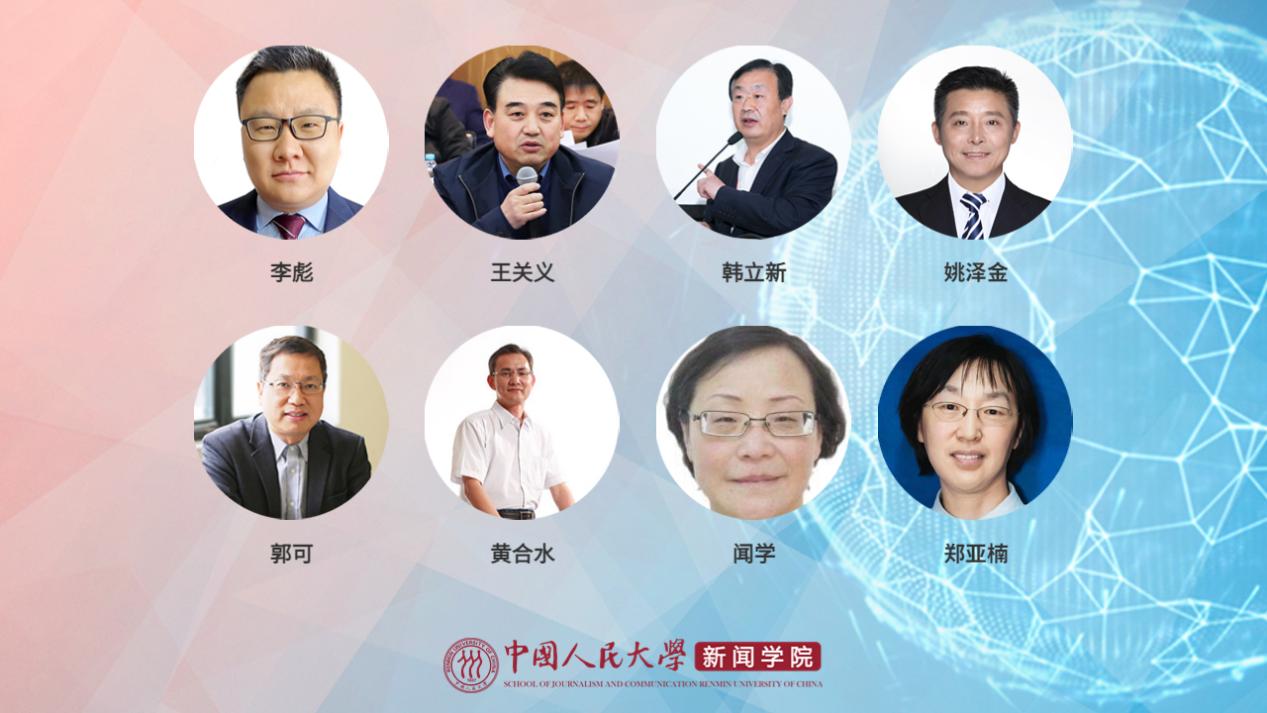
Wang Guangyi, Vice Dean of Beijing Printing Institute, discussed the five aspects of professional setting, talent training orientation, improving professional training programs, professional construction and talent training, and training links, sharing his thoughts on the cultivation of journalism and communication talents in the context of the new liberal arts.
Han Lixin, Dean of the School of Journalism and Communication of Hebei University, and Zheng Ya’nan, Professor of the School of Journalism and Communication of Zhejiang Media College, shared their opinions from the perspective of the journalistic historical events of propagandaand the perspective of digital journalism and communication respectively, anchoring the cultivation of top innovative talents in the construction of an autonomous knowledge system.
Huang Heshui, Professor of the School of Journalism and Communication of Xiamen University, divided the cultivation of top talents into management elite and professional operation. He said that the cultivation of talents should include threeaspects: intellectual intelligence, emotional intelligence and vocational intelligence.
Guo Ke, Dean of the School of Journalism and Communication of Shanghai International Studies University, focused on the cultivation of innovative talents in international communication, using the concrete practice of cultivating new talents in Shanghai International Studies University as an example, and offered advice on the integration of the cultivation of top innovative talents.
Wen Xue, Professor of the School of Language and Communication of Beijing Jiaotong University, shared his thoughts on the cultivation of new talents in the context of the new liberal arts, starting with the reform of his School, and focusing on both the curriculum and teachers.
On the issue of cultivation paths, Yao Zejin, Executive Vice President of Guangming School of Journalism and Communication, China University of Political Science and Law, proposed an "understanding support model", which includes a free, open and inclusive learning and innovation atmosphere, a personal growth environment where students are understood, respected and supported, and policy support that respects students' freedom of choice, interest development, and support and guidance.
The fourth module of the forum, hosted by Han Xiaoning, Vice Dean of the Schooloof Journalismand Communication OF Renmin Universityof China, gathered the views of seven experts and scholars to discuss the cultivation of top-notch innovative talents.
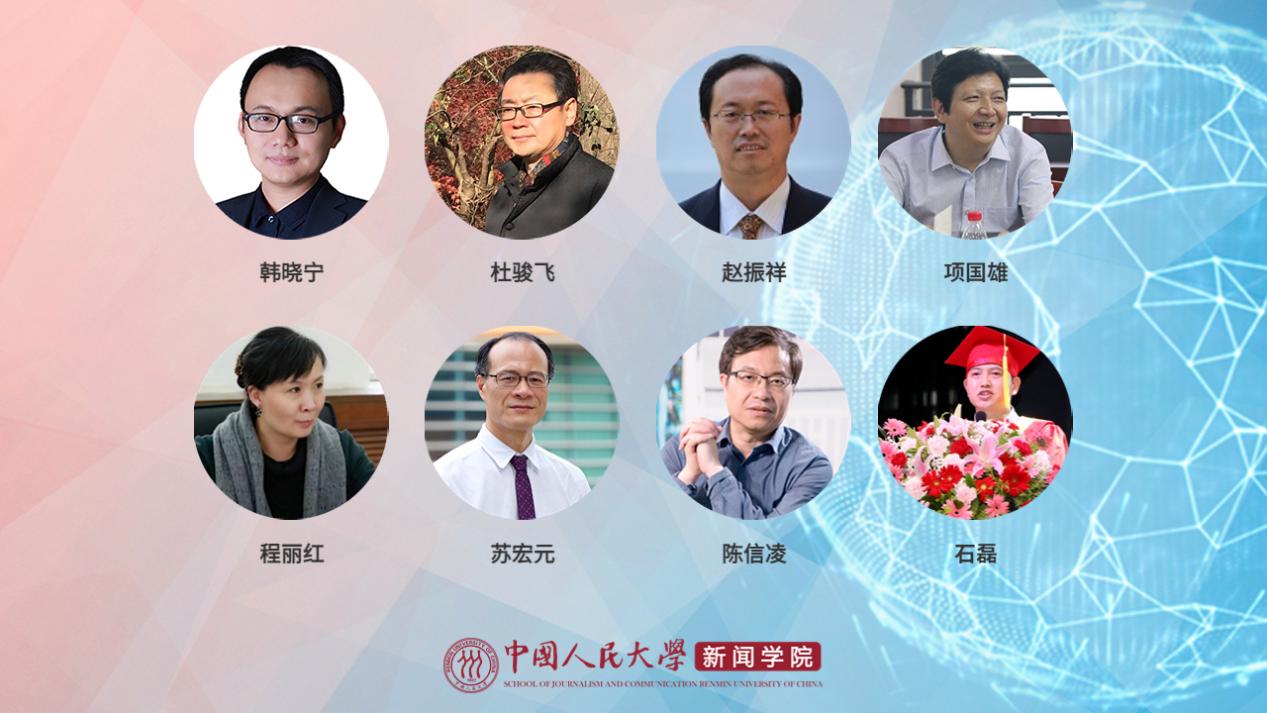
Du Junfei, Professor of the School of Journalism and Communication of Nanjing University, and Shi Lei, Dean of the School of Journalism and Communication of Chengdu Sport University, added their knowledge and thoughts on talent development to their dialogue with previous speakers on the four elements of training top innovative talents and the full cycle of student development.
According to Xiang Guoxiong,Vice President of Jiangxi Normal University, the growth pattern of top-notch innovative talents can be summarised as "two ‘famous’, one ‘golden’ and one ‘major’", i.e., famous school, famous teacher, golden age and major project.
Cheng Lihong, Dean of the School of Journalism and Communication of Liaoning University, believes that profound humanistic heritage is fundamental in the cultivation of top innovative talents and that the cultivation of humanistic spirit and the cultivation of innovative consciousness and thinking ability should be highlighted.
SuHongyuan, Professor of the School of Journalism and Communication of South China University of Technology, emphasized the importance of top-notch innovative talents as a national strategy from the perspective of national historical development. He also defined the goal of training top-notch innovative talents ascultivating talents with "broad caliber, solid foundation, strong ability and high quality".
Chen Xinling, Professor of the School of Journalism and Communication of Nanchang University, discussed the training of top-notch talents from the perspective of Chinese modernization, emphasizing that journalism education should be based on practical needs and aim at cultivating high-quality professionals needed for economic and social development. The training path includes three aspects: center focusing, system restructuring, and processreengineering.
Zhao Zhenxiang, Professor of the School of Journalism and Communication of Xiamen University, took the specific talent training program of Xiamen University of Technology as an example to share with the attending guests, focusing on the construction and talent training for the major of Network and New Media, from the perspective of "New Liberal Arts".
The fifth module of the forum was presided over by Yan Yan, Deputy Secretary of the Party Committee of the Schoolof Journalismand Communicationof Renmin Universityof China. Seven experts and scholars participated in the sharing and discussion.
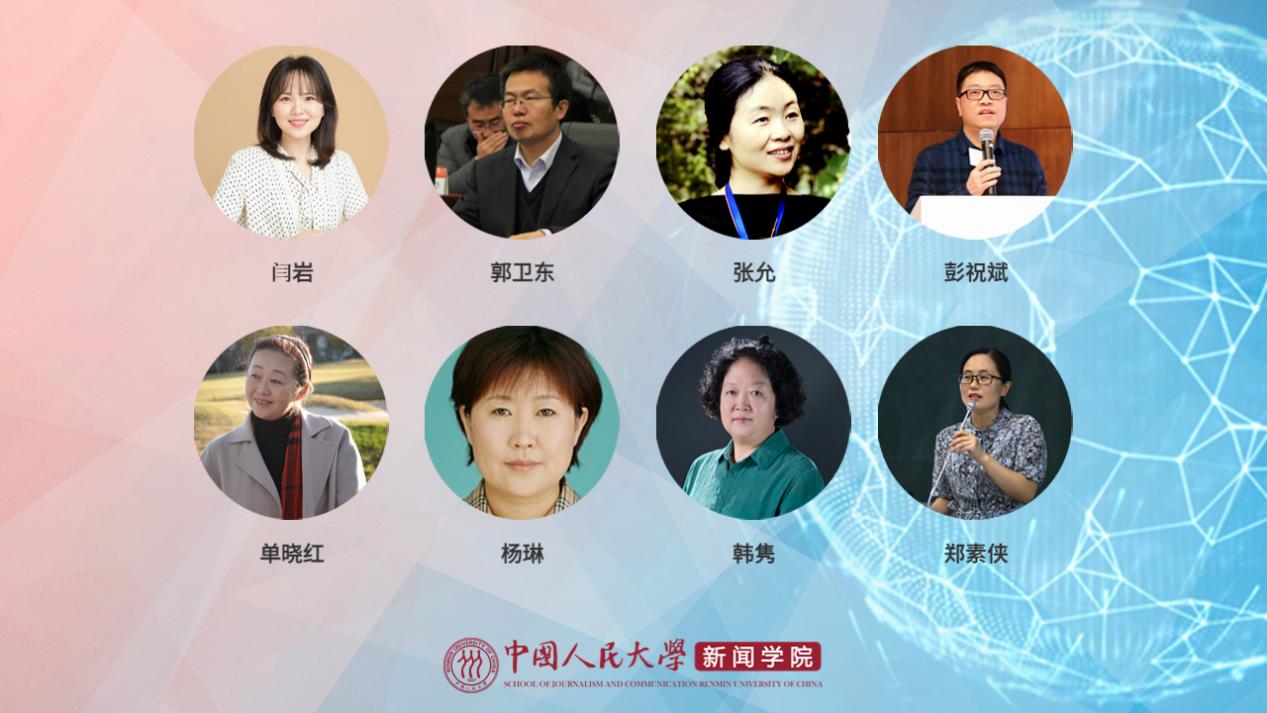
Guo Weidong, Deputy Dean of Communication University of Shanxi, focused on the cultivation of innovative and applied talents.He took the talent training of Communication University of Shanxi as a case to share, believing that colleges and universities should follow the school-running philosophy that holds media as the root, soul-casting as the foundation, equally emphasizes theory and practice, and keeps upright as well as innovate.
Shan Xiaohong, Professor of the School of Journalism of Yunnan University, shared and discussed the practical teaching with integration of production and education at the School of Journalism of Yunnan University with the participating scholars. She said that the new education model of integrating production-education can provide a new path for the cultivation of top-notch innovative talents, and create an immersive training platform to provide new possibilities for the cultivation of innovative talents.
Han Juan, Deputy Dean of New Media Research Institute of Northwest University, took social services in the talent training of the School of Journalism and Communication of Northwest University as an example and emphasized the importance of social services as an engine to empower the education and scientific research practice of professional disciplines.
Zhang Yun, Dean of the School of Journalism and Communication of Xinjiang University, had a dialogue with the participating scholars on the topic of the construction of independent knowledge system. She said that it is necessary to build a knowledge system from the perspective of learners, to rely on ideological and political curricula to strengthen thinking construction and to build innovative knowledge system with open interactions.
Peng Zhubin, Professor of the School of Journalism and Communication of Hunan University, expressed his views on the characteristics that top-notch innovative talents should have. He believed that top-notch innovative talents should have broad interests, independent personality, passion, and rich imaginations. The cultivation of top-notch talents needs to be oriented towards Chinese-style modernization to shape value, towards the community with a shared future for mankind to develop capabilities, and towards digital civilization to reconstruct the knowledge system.
Yang Lin, Professor of the School of Journalism and New Media of Xi'an Jiaotong University, said that in addition to discussing the value of technology to comprehensive professional quality, the cultivation of top-notch talents should return to the cultivation and improvement of humanistic heritage and professional literacy.
Zheng Suxia, Deputy Dean of the School of Journalism and Communication of Zhengzhou University, focused on how to protect the boundary of journalism and communication education while cultivating cross-border top-notch innovative talents in journalism and communication. She said that the cultivation of cross-border talents can be achieved by updating the curriculum system, creating new majors, and establishing excellent innovative experimental classes. While expanding the knowledge frontier of journalism and communication, it is also necessary to form a new boundary that marks the autonomy of the discipline, to inherit the core knowledge and value of the discipline, and to strive to build an independent knowledge system of the discipline.
At the end of the forum, Zhou Yong made a summary. He said that talent training is the focus of the discipline of journalism and communication, and the academic community will carry out continuous discussions on this issue in the future. There will be confusion and hesitation in the development of disciplines. Therefore, the construction of disciplinary communities is of vital importance.Only by working together with journalism and communication departments across the country can we better respond to the great requirements of the great era.
Since 2019, the five undergraduate majors of the School of Journalism and Communication of Renmin University of China, Journalism, Communication, Broadcasting and Television, Advertising, and International Journalism and Communication, have all been selected as national first-class undergraduate majors. In order to discuss the cultivation of top-notch talents in various majors more pertinently, five sub-forums on the construction of national first-class undergraduate majors were heldat the same time as the main forum on the afternoon of the 19th. Academic colleagues from major journalism schools in China were invited for each major to the forums to carry out discussions about the cultivation and construction of top-notch innovative talents.
(Translator: Cui Shaofeng, Du Tianshu, Yang Chuchu)
(Editor: XiongYansha, Xiao Muqing, Wu Hongyi, Zhou Minhua)



